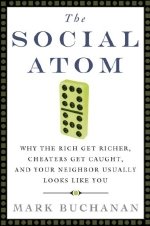Just about any kind of human behavior or characteristic can spread between people more or less mechanically, like a virus. This is hardly news anymore; it's been found in most crime, in decisions to buy cellphones or have children, in suicides, you name it. Now a new study reported in the New York Times demonstrates the case for obesity as well. Fat spreads. (A possible mechanism, the researchers suggest, is that people with obese friends revise their views on what is an acceptable body type.)
The NYT article touches on an extremely delicate topic. If obesity is a serious health problem, akin to a disease, then it looks as if it's a disease that spreads. So should people drop their fat friends? That's clearly a reprehensible take on the matter; one could easily reverse the perspective and say that thinness and health spreads too, so that befriending the fat is an act for public health. Not to mention that lots of recent psychology shows that we judge our well being in relative terms, comparing ourselves to those around us. So having fatter friends is probably good for our self esteem, and that surely feeds into health as well.
But I'm betting that more than a few people will draw some weird and anti-social conclusions from this...
Curiously, and it seems accidently, Dick Cavett also talks about obesity in an opinion piece, also in the New York Times. He makes a very good point that advertisers seem to have taken note of the rapidly increasing size of the American person, and put obese people all over television:
This disturbs me in ways I haven’t fully figured out, and in a few that I have. The obese man on the orange bench, the fat pharmacist in the drug store commercial and all of the other heavily larded folks being used to sell products distresses me. Mostly because the message in all this is that its O.K. to be fat.
Of course, advertising isn't the primary cause of U.S. obesity, which seems clearly linked to changes in food technology that have made high-calorie junk food readily available in a convenient format and extremely cheap. Oh yeah, and government subsidies for snack foods and soft drinks, manufactured out of corn syrup and soybean oil. I saw a study recently, don't recall where, showing that junk food in pure calorie-to-cost ratio is the cheapest food there is in the typical supermarket; so the incentive is there for anyone with limited funds to buy it.
A sensible government would take steps to change matter. Will our government be sensible? Don't hold your breath.




3 comments:
I'm deeply suspicious of the finding. The NYTimes article mentions that the method is completely unique and unlikely to be replicated. That is one big warning. Second, the research was done by physicians, that's another big warning to me. Their methodology and statistics are often funky.
Here's the specific comment in the article that rouses my doubts: "...people were most likely to become obese when a friend became obese. ...There was no effect when a neighbor gained or lost weight, however, and family members had less influence than friends.
It did not even matter if the friend was hundreds of miles away, the influence remained. And the greatest influence of all was between close mutual friends..."
The effect remained even if the friend was hundreds of miles away? And family members had less influence than distant friends???? Hmmm.
Before I spent too much time trying to come up with a psychological explanation for this finding, I'd start with the hypothesis that this is a statistical artifact, reflecting some kind of systematic error. Prove that hypothesis wrong first.
I think there are other factors that contribute to the expansion of the American waistline (and I'll admit up front that I am not a svelte as I once was). We tend to work long hours at sedentary jobs. These work hours are bracketed by long commutes, mostly spent alone in cars. There's a line in A Hard Day's Night that sums up our lifestyle. the character of Paul's Grandfather says, "But so far, I've been in a train and a room, and a car and a room, and a room and a room." Replace the word "car" for "train" and one of the rooms, and you've got the average American life.
Kate,
You may be right. We'll have to wait and see. The Framingham study is certainly unique in the terms of the extensive data it produced.
But I'm not so pessimistic of someone else being at least able to perform a similar study in the not-too-distant future. It can't be too long before all kinds of bio-sensors will revolutionize medical monitoring, gathering and storing data automatically on a huge scale. Putting that together with all the emerging data on social networks (from cell phones, the Internet etc), one can imagine a far larger study sometime in the future...though not now.
Post a Comment